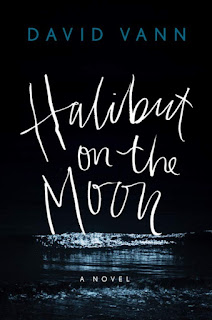HALIBUT ON THE MOON (2019)
By David Vann
Grove Atlantic, 260 pages.
★★★
Halibut on the Moon was deaccessioned rather quickly by my local library, so I had to track it down for an interlibrary loan. I admit that I was mostly intrigued by the title, but now I understand why it had such a short shelf life. Not many people want to read about a guy contemplating suicide, even if the tale is fictional. I get that, though I give author David Vann credit for capturing the despair and hopelessness associated with chronic depression.
One wonders if any part of the novel is autobiographical, given that the protagonist is 39-year-old Jim Vann. Jim has been living in Fairbanks since his second marriage to Rhoda ended in divorce. Alaska, with its painfully short winter days, is not the best place for a gloomy person to live–especially in a home he’s never bothered to furnish. His younger brother Gary convinces him that he needs to come to get over his woes by spending time with his family in California. Jim has two children, David, and Tracy, to his first wife Elizabeth, plus a sister (Ginny), and both parents scattered between Santa Rosa and Lakeport, the latter where Jim was once a dentist like his father. Like many, Gary treats “family” as if it’s a magical incantation rather than one of the things that might fuel depression. The psychiatrist Jim sees in Lakeport is incompetent, but he’s at least smart enough to start him on medication immediately. The kicker is that the drugs take at least two weeks to kick in and Jim carries a .44 magnum with him because he’s not sure he can take his anguish any longer.
Jim is the epitome of a hollowed-out man. He’s intelligent but he trashed his career, repeatedly cheated on both wives, frequents hookers, owes the IRS $365,000, can’t sleep, doesn’t believe in anything, and is especially contemptuous of his family’s Lutheranism. Nor does he possess many filters, so even those trying to help him vacillate between sympathy and repulsion. All he wants to do is call Rhoda and have sex with her. He can’t even articulate why, as he doesn’t find her very attractive and family members try to tell him that she’s “poison.” Perhaps she’s just the only thing remotely interesting in Lakeport, a small town of about 5,000 souls in which nothing much happens. Jim even has to scale a fence to get to its namesake shoreside.
For sure Jim is several fries short of a Happy Meal. He shoots a scrub jay and talks of cooking it. The book’s title is a preposterous tale he tells his kids of sending an astronaut halibut to the moon, where it flies. The meds mess with him; he’s manic one moment and fingering his gun the next. He imagines he should be proud of his Cherokee ancestry, though he can’t muster much enthusiasm about that or anything else. Mostly he ponders suicide and views himself as a breathing ghost
The open question is whether Jim will become a non-breathing ghost. Halibut on the Moon is an interior novel told from Jim’s point of view. It’s a short book that’s long on troubled thoughts, an apt lens through which to view someone who can’t see beyond his pain and isn’t sure he wants to. Still, dwelling upon Jim’s dark, angst-ridden, and disjointed thoughts parallels his conflicted self-awareness, but it makes the book a will-he-or-won’t-he one-trick pony. In essence, Jim is on a roller coaster between life and death perched on the crest of a steep piece of track; “stalled” is a challenging place for readers along for the ride.
Should you nonetheless read Halibut on the Moon? It depends. If you think of it as didactic, you will attain a deeper understanding of a mental state you never wish to visit. You will also get the message that telling a profoundly disturbed person to snap out of it and be thankful for what he has is a ludicrous piece of advice. If you’re reading for pleasure, that’s another matter altogether. Either way, though, be cautious of thinking of family as a panacea.
Rob Weir




No comments:
Post a Comment